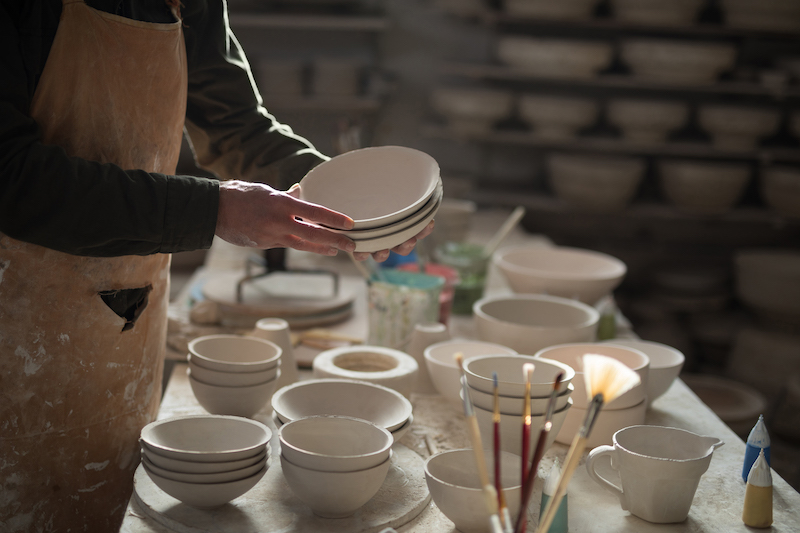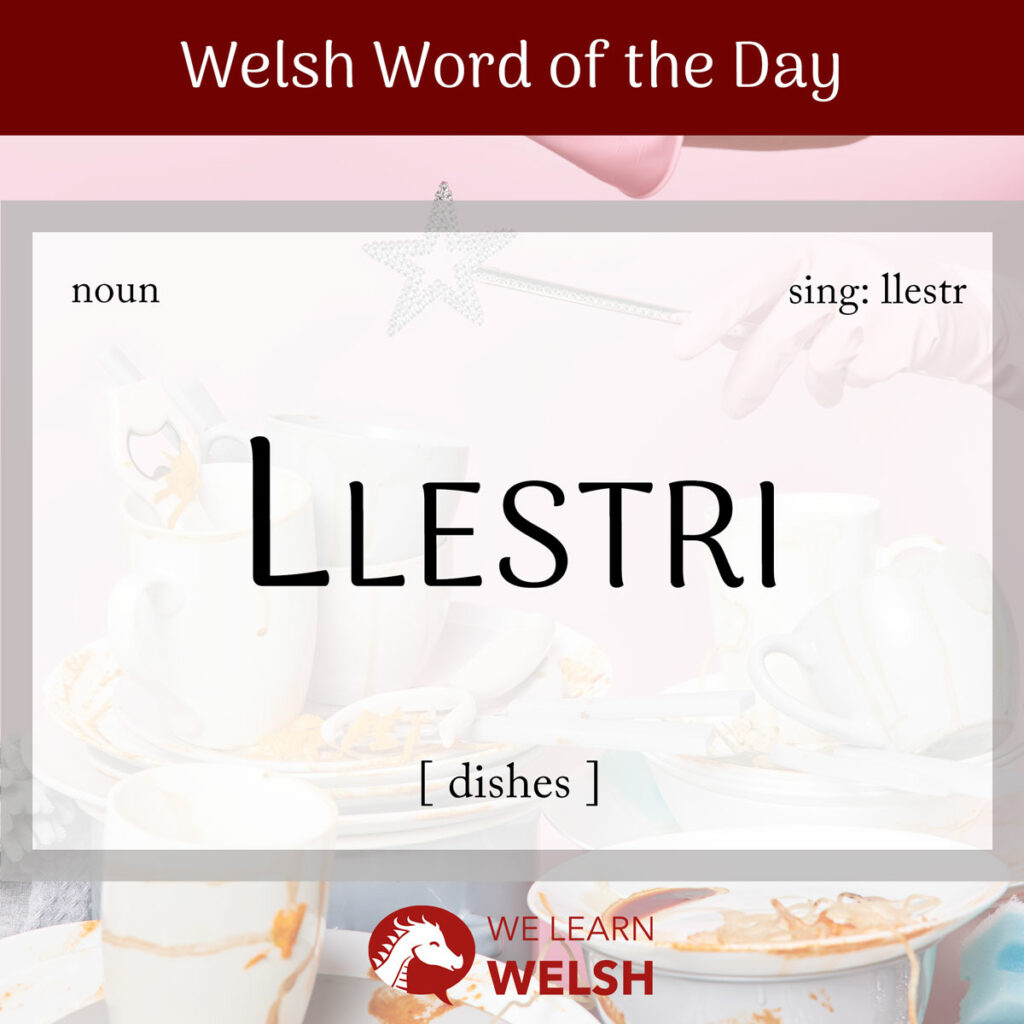Llestri is the plural form of llestr, which has a range of definitions relating to different kinds of vessels. But on a day-to-day basis, it more often than not refers to dishes, or crockery generally.
llestri
dishes / vessels
llestr
a dish / a vessel
As a singular noun, llestr is masculine. It comes from the proto-Celtic *lestrom (pot) and is related to the very similar Breton word lestr (a vessel or a receptacle). There are some variations in its pronunciation, with many South Walians turning it into two syllables rather than retaining the abrupt tr sound at the end of the word, but what’s given above is standard.
We’ll focus on the plural form llestri for today because it’s the more familiar and everyday piece of vocabulary.
Here is how it mutates:
Soft mutation
lestri
Nasal mutation
N/A
Aspirate mutation
N/A
An example of this mutation in action would be ei lestri, meaning his dishes.
This isn’t the only way to say dishes or crockery in Welsh. You can also use the word dysglau, sometimes pronounced dyshglau in the South.
Which one is appropriate is generally a matter of personal choice. I always say gwneud y llestri (to do the dishes) or golchi’r llestri (to wash the dishes). And of course after golchi’r llestri you’ll need to sychu’r llestri (dry the dishes) with a clwt llestri / lliain llestri / cadach llestri (dish cloth).
When I’m referring to a specific kind of dish, I’m more likely to say dysgl – as in dysgl fenyn (butter dish). But on the other hand, it’s normal to use terms like llestri tsieina (china dishes), llestri te (tea set), or llestri priddion (earthenware dishes).
So it’s not necessarily a rule of thumb that llestri is used for verbal phrases and dysgl is used to describe the dishes themselves. It’s more to do with dialect and what people are raised with.
Allet ti sychu’r llestri ar ôl i ti eu golchi, plîs?
Could you dry the dishes after you’ve washed them, please?
Llestri for dishes can also be used in a wider sense than just the crockery we bwyta (eat) from, even before we get to less literal meanings.
One example would be milking pail. There are loads of different ways to say this in Welsh, reflecting the fact that it’s mostly used by farming communities which may be more insular. I would say bwced odro or pail godro. Others might go for bwced laeth, pail llaeth, cunnog laeth or indeed llestr godro (literally milking dish).
Now, as I mentioned, llestri technically correlates to the English word vessels. This applies not just to vessels as in crockery, but also to vessels as in for travel. Interestingly, when used in this way, the singular llestr may sometimes be treated as a feminine noun, going against the default for this word.
However, it tends to be used this way only in grandiose, formal contexts. You would be very unlikely to say llestri when you mean ships, for example; you’d just say llongau.
A similar case is llestr meaning womb – this is technically an accurate translation but is only used in literary Welsh, not colloquial language.
Interestingly, it is more common to use it in this way when you mean blood vessels. Though you could stick with words like gwythiennau (veins) or rhedwelïau (arteries), the term gwaedlestri is likely to be recognised by most people.
Another fun usage is the phrase llestr gwenyn. This is a word for beehive that some people in the South use, alongside the standard cwch gwenyn (literally bee boat!).
Mae fy chwaer Elin bob amser yn mynd dros ben llestri gyda’i straeon.
My sister Elin always exaggerates her stories.
One popular Welsh idiom you may be familiar with is the classic dros ben llestri, which means over the top. Literally, it’s over the top of the dishes. People use dros ben llestri all the time – it’s one of the most popular and universal expressions throughout Wales. It’s versatile, too, as you can use it to describe something that is ridiculous, or adapt it to mynd dros ben llestri to mean either going over the top or sometimes more specifically exaggerating.
What’s even more amusing is that one of Wales’ most famous patriotic songs is about llestri. This, of course, is Sosban Fach (Little Saucepan).
Sosban Fach is a very silly song which was adapted from a poem about a housewife struggling with everything going wrong in the tŷ (house). The chorus bears this refrain:
Sosban fach
Yn berwi ar y tân
Sosban fawr
Yn berwi ar y llawr
A’r gath wedi sgramo
Joni bach
A little saucepan
Is boiling on the fire
A big saucepan
Is boiling on the floor
And the cat has scratched
Little Johnny
And the word llestri itself appears in one of the later verses, which diverts from the main story of the song to follow a hen wraig (old woman) going to y farchnad (the market).
Aeth hen Fari Jones i Ffair y Caerau
I brynu set o lestri de;
Ond mynd i’r ffos aeth Mari gyda’i llestri
Trwy yfed gormod lawer iawn o de
Old Mary Jones went to Caearau Fair
To buy a tea set
But Mary and her tea set ended up in a ditch
By drinking much too much tea
As you can see, we’re seeing the phrase llestri te that I mentioned earlier. And it’s become lestri te through soft mutation, because of the preposition o (of). We then see llestri again in the next line, being used to refer to the cwpanau (cups) and pot te (teapot) that she bought.
The implication is that Mari wasn’t actually drinking te (tea) but something a little stronger – so the llestri unfortunately get broken in the ditch after she gets a little too meddw (drunk)!
Sosban Fach always makes me laugh, because we really do sing it with the same amount of verve and patriotism as much more meaningful songs like Calon Lân (A Pure Heart) or Yma o Hyd (Still Here), despite the goofy lyrics.


